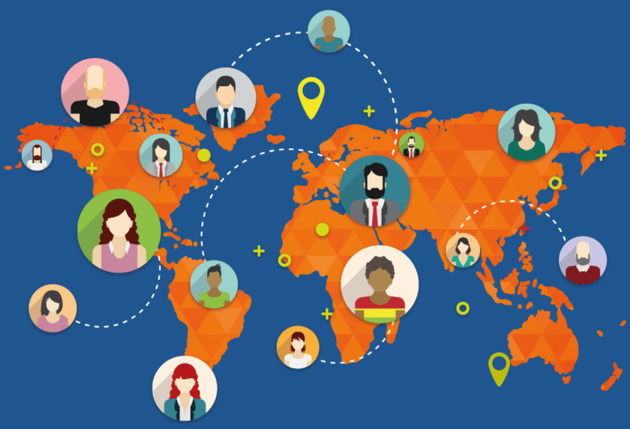Developed countries
complain about job losses, but have social policies that protect the
unemployed, while third world people, living below the poverty line,
desperately need jobs. It is true that systemic unemployment, resulting from
automation and artificial intelligence, grows exponentially, but it demands
large capital and has to compete with cheap labor from underdeveloped
countries, allowing a reduction in the pace of robotization and unemployment.
 The Covid-19 pandemic,
however, is demonstrating that such an ideal needs supranational planning and
regulation, in order to avoid the monopolization of the production of certain
goods, of vital need to all countries, by nations that have some intrinsic
competitive advantage, such as the immensity of China's population, which makes
it the largest domestic market, whose service demands and causes industrial
production on an extremely high scale.
The Covid-19 pandemic,
however, is demonstrating that such an ideal needs supranational planning and
regulation, in order to avoid the monopolization of the production of certain
goods, of vital need to all countries, by nations that have some intrinsic
competitive advantage, such as the immensity of China's population, which makes
it the largest domestic market, whose service demands and causes industrial
production on an extremely high scale.
The European unified
market is about a third, the North American a quarter and the Brazilian only
fifteen percent of the Chinese. The first two have long been in the class of
economically developed people, therefore with little leverage for growth,
because the basic needs of their people are already largely satisfied. Brazil
is a strong candidate for rapid development because it has many people in need
of basic needs such as sanitary sewage. On the other hand, more than five
hundred million Chinese are at the lower and lower middle class level, which
means almost two populations of the United States as a market eager to consume
and grow.
In addition, the Chinese
people have been subjected - and accustomed to obeying - to dictatorial
governments for thousands of years, are extremely hardworking and highly
literate, offering laborious, disciplined, educated and cheap labor, everything
that the industry needs, along with management, technology and capital to develop
very quickly.
European and American
industrialists and workers prospered and enriched in the post-war period and
became fat cats and all they want is to be asleep on the sofa. It is no wonder
that Europe and North America attracted millions of immigrants to take up their
menial jobs and went through the third world in search of laborious,
disciplined, educated and cheap labor.
When Mao Tse-Tung ascended
the Marxist pantheon, he opened the way for Deng Xiaoping to carry out the
“second revolution”, a mixed policy of nationalizing a few sectors considered
strategic and freeing the rest for entrepreneurship and capital, both Chinese
and foreign. From 1978, China started a “great march” towards prosperity that,
in four decades, transformed it into the largest exporter of industrial goods
on the planet, to the point that it is now almost the sole supplier of some
products and threatens to monopolize, for example, the fifth generation of
mobile internet.
At this moment of great
affliction caused by the coronavirus, the World, in a long Indian line, begs
the Chinese industrialists for pulmonary ventilators essential to the treatment
of severe cases of pneumonia caused by Covid-19.
Donald Trump, considered
by many as a crude unsympathetic, with his vision of a businessman accustomed to
the clashes of interests in millionaire negotiations, has enough acuity to
perceive the mess his country was taken by political immediacy and lack of long-term
strategic vision. Trump knows that, in addition to the competitive advantages
inherent in Chinese work culture, China undervalues its
currency, the yuan, making its production extremely attractive compared to the
rest of the world.
The "America
first" campaign aims to return to the United States jobs that have been
taken to other nations and prevent technologies of general application, such as
the G5, from escaping American control.
The fact that the rest of
the world is dependent on China for equipment and supplies for medical
treatment, even the simplest ones, such as surgical masks, in this Covid-19
crisis, leads us to reflect on the future of globalized trade and regarding
arrangements to diversify sources of supply.
China has long invested
heavily in infrastructure and encourages food production in Africa to become
less dependent on its two largest protein suppliers: United States and Brazil.
This example must be
emulated by other countries that, like Brazil, whose industry loses successive
clashes with China, not only due to its smaller scale of production, but also
due to exchange rate disadvantage. This, however, can lead to successive market
closures through bureaucratic, sanitary, currency devaluation and fiscal
barriers, with retrocession of globalization, which has contributed so much to
the spread of wealth around the world, benefiting extremely poor nations, like
Bangladesh, although, as we see now, mainly China.
The UN or WTO should study
this issue and propose an international trade policy that, at the same time,
promote free movement of people, goods, services and capital, and avoid the
concentration of benefits and monopolies in just one country or region.
The world needs
alternative sources, second suppliers, to gain independence from Chinese
strangulation.
PLEASE COMMENT.
PLEASE COMMENT.
Nenhum comentário:
Postar um comentário